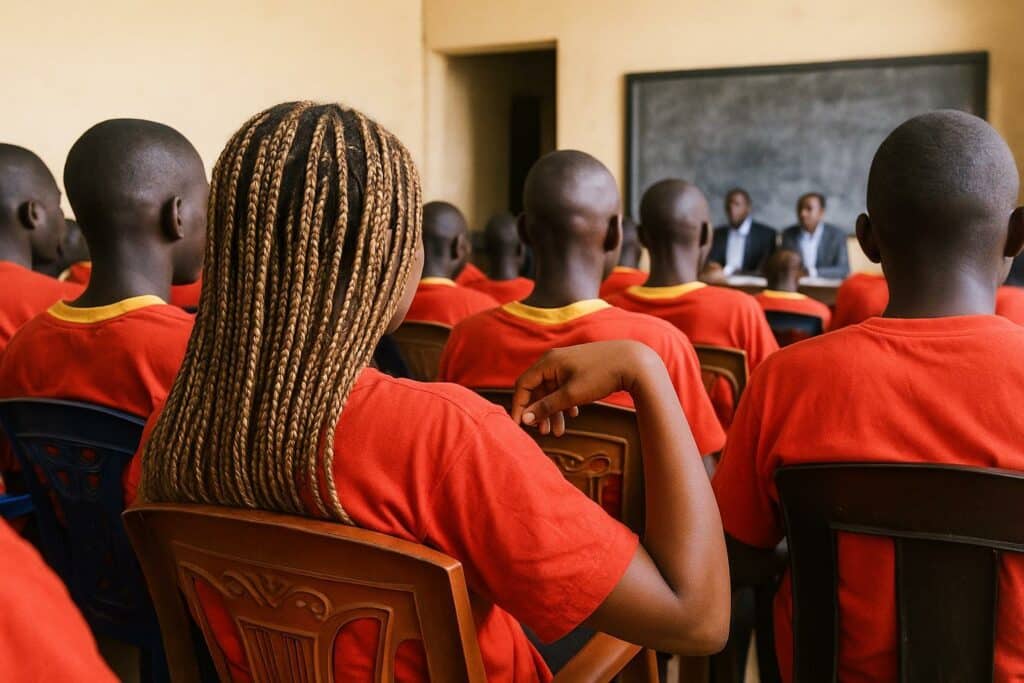Exam Success in Brazzaville Correctional Facility
The rust-coloured gates of the Brazzaville Remand and Correction Centre briefly opened on 20 September not to release inmates but to let knowledge in. During a tightly choreographed ceremony, Colonel-Major Jean Blaise Komo, Director-General of the Penitentiary Administration, distributed the official attestations for the 2025 session of State examinations: the Primary School Certificate, the Junior Secondary Brevet and, most coveted, the General Baccalaureate. In a context where study hours are constrained by security protocols and materials often scarce, fourteen candidates had nevertheless braved the syllabus; eleven were declared successful, a record percentage that the administration celebrates as a pedagogical breakthrough.
The colonel-major reminded the assembly that the baccalaureate constitutes the first university diploma and therefore a bridge toward the public universities Marien-Ngouabi and Denis-Sassou-Nguesso. “You have conquered the first summit,” he insisted, “now prepare for the ascent of higher learning.” (Observation made during the official visit).
Voices from the Cellblock: A Respectful Plea for Freedom
Flanked by fellow graduates still dressed in regulation khaki, one inmate spoke for the group with measured solemnity. He recalled that the Head of State had proclaimed 2024 and 2025 “Years of Youth” and linked that national ambition to their own rehabilitation journey. Their request was unambiguous yet deferential: a presidential act of clemency that would allow immediate enrolment at university and, by extension, faster social reintegration. “This freedom would let us contribute to building tomorrow’s Congo,” he affirmed, the diploma trembling slightly in his grasp. The intervention—neither thundering nor accusatory—was met with nods from prison officials and discreet tears from a handful of relatives attending the ceremony.
State Policy on Youth and Reintegration
Congo-Brazzaville’s penitentiary education programme, launched in 2017, has matured into an institutional pillar. Each fiscal year the Justice Ministry allocates dedicated credits for textbooks, laboratory kits and distance-learning terminals. Successive cohorts have chipped away at the stigma surrounding incarceration, but the 2025 results mark a qualitative leap: pass rates climbed from just under eighty percent last year to well above ninety-five percent. Authorities frame this trajectory as evidence that the national youth agenda can transcend prison walls, a narrative welcomed by civil-society educators who see in it an antidote to recidivism.
Legal Framework Governing Presidential Clemency
Congolese law grants the President discretionary power to commute or remit sentences after advisory opinions from the Ministry of Justice. Historically, collective clemency has coincided with national celebrations or humanitarian imperatives. Legal scholars observe that academic excellence, while not expressly listed among statutory criteria, can be invoked as proof of rehabilitation. Should the current plea proceed, it would likely follow a multi-step review: verification of individual disciplinary records, assessment of public-order considerations and final signature by the Head of State. Such a pathway preserves institutional checks while honouring the Constitution’s rehabilitative philosophy.
Educational Logistics: From Textbooks to University Halls
Beyond the moral symbolism, practical hurdles abound. University admission requires original transcripts, medical certificates and, crucially, physical presence in lecture halls. The Penitentiary Administration is already negotiating a temporary study-leave protocol with Marien-Ngouabi University that would allow escorted attendance or hybrid online formats should clemency be delayed. Colonel-Major Komo delivered boxes of exercise books, mathematical sets and French literature anthologies to ensure continuity of learning inside the facility. “If we achieved ninety-seven percent this year, we aim for one hundred next year,” he declared, signalling that the classroom behind bars is now an enduring fixture, not an experiment.
À retenir
The unprecedented ceremony has crystallised three facts: first, prison education in Congo has reached a level of organisational maturity; second, academic merit is increasingly viewed as a metric of readiness for social reintegration; third, the detainees’ request aligns rhetorically with the national focus on youth empowerment, offering the Presidency a legally sound, politically resonant option for clemency.
Le point juridique/éco
Experts in correctional economics estimate that every franc invested in inmate education yields multiple savings by lowering repeat-offence rates. A conditional release tied to university attendance could therefore generate fiscal benefits alongside the evident human dividend. From a rule-of-law perspective, the case presents an opportunity to illustrate how executive prerogative can complement, rather than circumvent, judicial decisions in the service of rehabilitation.

